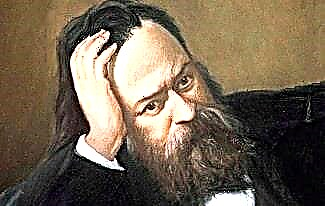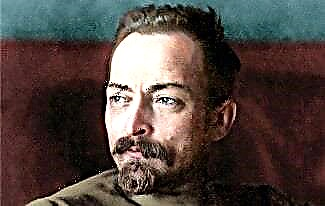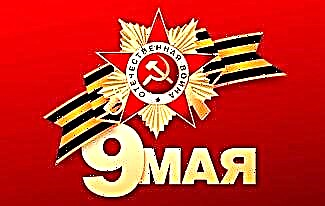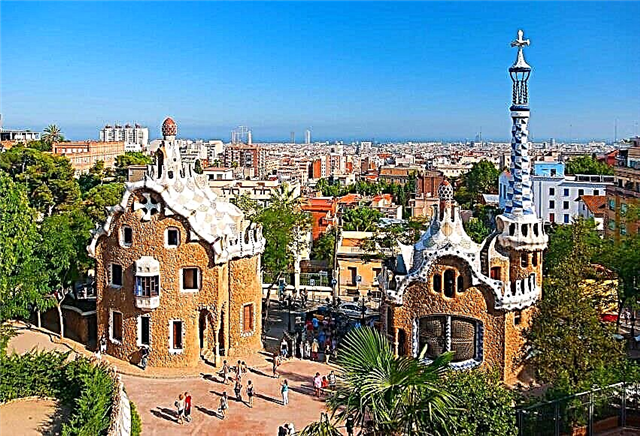The novel in verse "Eugene Onegin" became a real revolution in Russian literature. And from the point of view of the plot, and from the point of view of language, and as a way of self-expression of the author, “Eugene Onegin” has no analogues in Russian literature. It is enough to read the poetic works created by Pushkin's predecessors to understand that all the theses about the development of Russian literature, cherished by Soviet, first of all, criticism, are nothing more than fitting the evidence to a predetermined result.
The work written - not without reservations, of course - in living language sharply differed from the examples already available. Critics, who perceived "Eugene Onegin" rather ambiguously, blamed Pushkin for such things as combining the words "peasant" and "triumphant" in one line - a common word, according to the concepts of the then poetry, could not be combined with the high verb "triumph". The phrase “frosty dust to silver his beaver collar” could not be used at all in poetry, for a beaver collar is a vulgar thing, it was not worn by either Orestes, Zeus, or Achilles.

Five rubles per chapter + 80 kopecks for shipping. If Stephen King had carefully studied the history of Russian literature, he would have been the richest
“Eugene Onegin” became a breakthrough both in plot and in its own language, and in that the author, describing the characters, does not shy away from expressing his opinion. Pushkin not only outlined a certain plot, but also substantiated its development, psychologically explained the actions of the heroes. And the whole structure of the author is based on a powerful basis of knowledge of everyday life, the rigid rules of which did little to contribute to the independent behavior of the heroes. Here is Onegin's need to go to the village, and “I am given to another,” and “Love has passed, a muse has appeared”. And at the same time Pushkin wanted to show that the will of a person means something. This is especially clearly seen in the lines, which are, as it were, an epitaph for Lensky.
Here are a few facts that may help to better understand one of the greatest works of Russian literature and the history of its creation:
1. Pushkin did not have a single plot idea for "Eugene Onegin". In one of the letters, he complains that Tatiana “ran away” with him - she got married. Nevertheless, the poet's talent is so great that the work looks solid, like a monolith. Pushkin's characterization “collection of colorful chapters” refers to the chronology of the publication, because each chapter was published separately.
2. AS Pushkin's fee for the novel in verse was 12,000 rubles. That is, for each line (there are just over 7,500), the poet received about 1.5 rubles. It is rather difficult to calculate the exact equivalent of Pushkin's earnings in today's rubles - both prices and costs were different. If we proceed from the prices of simple foodstuffs, now Pushkin would receive about 11-12 million rubles. It took the poet more than 7 years to write the novel.
3. You can often come across the statement that Pushkin very well described precisely the everyday side of the noble life of those years. Belinsky wrote about the novel in general as an encyclopedia of Russian life. There are really enough descriptions of the lines of everyday life in Eugene Onegin, but already half a century after the novel was published, many features of everyday life became incomprehensible to readers.
4. Memoirs and correspondence of contemporaries testify to the psychological accuracy of the description of the characters in Eugene Onegin. Literally dozens of people believed that Alexander Sergeevich “registered” them in the novel. But the infamous Wilhelm Kuchelbecker went farthest. According to Kyukhli, Pushkin portrayed himself in the image of Tatiana.
5. Despite the obvious far-fetched conclusion of Kuchelbecker, Pushkin is one of the main characters of his own novel. And this is the special charm of the work. The author constantly gets in with his remarks, explanations and explanations, even where it is not required at all. Walking around, Pushkin manages to ridicule the noble customs, and explain the actions of the heroes, and communicate his attitude towards them. And all these escapades look very natural and do not tear the fabric of the narrative.
6. Debts, pledges, etc., often mentioned in the novel, were the scourge of not only middle-class nobles, but also the rich during the years of the novel. The state was indirectly to blame for this: the nobles took money from the State Bank on the security of estates and serfs. The loan ran out - they took a new one, for the next estate or the next "souls". Private loans at 10-12% per annum were also in use.
7. Onegin did not serve anywhere for a day, which was only theoretically possible. As usual, the nobles went to the military. Civilian service, with the exception of a number of areas like diplomacy, was less valued, but almost everyone served somewhere. Nobles who resigned after several years of service were viewed askance in society and hostile in power. And at the post stations they were provided with a minimum of horses, and last but not least.
8. Chapter XXXIX in the seventh part is not missed and is not blackened by the censorship - Pushkin introduced it to reinforce the impression of the length of the Larins' trip to Moscow.
9. About transport: go “on your own” - use your own horses and carriages. Long, but cheap. “At the postal” - to change horses at special post stations, where they might not exist, and the rules were quite strict. More expensive, but generally faster. "Discharge crew" - the then foreign car. "Boyarsky cart" - sleigh carriage. Arriving in Moscow, the carriages were hidden and “civilized” carriages were hired.


Carriages of snow are not afraid. You can immediately see ...
10. Onegin walks along the embankment at one o'clock for a reason. It was at this time that Emperor Alexander I made his unchanging walk, which attracted hundreds of representatives of the world to the embankment.
11. “There is no more room for confessions ...” than a ball. Indeed, practically the only place where young people could talk without supervision and prying ears was the ballroom. The holding of balls and the behavior of the participants was strictly regulated (in Chapter 1, Onegin appears at the ball in the midst of the mazurka, that is, it is impermissibly late), but the dance made it possible, as it were, to retire among the noisy crowd.
12. Analysis of Onegin's duel with Lensky and the circumstances preceding it shows that the manager of the duel Zaretsky was for some reason interested in the bloody outcome. The rules instructed the manager to try to achieve a peaceful outcome at each of the several stages preceding the actual duel. Even at the place of the fight, after Onegin was late by an hour, Zaretsky could cancel the duel (the rules allowed no more than 15 minutes of delay). And the rules of the shooting itself - converging up to 10 steps - were the most cruel. In such fights, both participants often suffered.
13. With regard to Onegin's attitude to Lensky, which the author characterizes as love, it is not clear to us why Onegin did not defiantly shoot by? Evgeny had no such right. A shot in the air was already a reason for a duel, as it deprived the enemy of choice - in those days, an unacceptable thing. Well, before Onegin's shot, the duelists walked 9 steps (first 4, then 5 more), that is, only 14 steps remained between them - a lethal distance if Lensky's anger is too strong.

10 steps away ...
14. Young Onegin, having barely arrived in St. Petersburg, cut his hair "in the latest fashion." Then it was a short haircut in the English style, for which the French hairdressers took 5 rubles. For comparison: a landowner family, moving for the winter from Nizhny Novgorod to St. Petersburg on their own transport, fit into the cost of 20 rubles, traveling on two dozen carriages and carriages. The average rent from a serf peasant was 20-25 rubles a year.
15. In stanza X of Chapter 2, Pushkin masterfully ridicules the rhymes common among classicist poets: “the moon is clear,” “obedient, simple-minded,” “serene, gentle,” “color — years,” etc.
16. Books are mentioned in the novel only three times, and these are works of 17 authors without any systematization.
17. The lack of knowledge of the Russian language by the nobles of the 19th century is now considered a commonplace. So Pushkin's Tatiana "did not know Russian well." But it's not that simple. The literary Russian language was then very poor in terms of the number of works. Contemporaries mention Karamzin's “History” and several literary works, while literature in foreign languages was very diverse.
18. An innocent line about flocks of jackdaws on the crosses of Moscow churches aroused the wrath of Metropolitan Filaret, who wrote about this to A. Kh. Benkendorf, who was in charge of the censorship. "The persecutor of Pushkin". The censor summoned by the chief of the III branch told Benckendorff that jackdaws sitting on crosses are more likely to fall under the competence of a police chief than a poet or censor. Benckendorff did not tease Filaret and simply wrote that the matter was not worth the attention of such a high-ranking hierarch.

A. Benckendorff endlessly spread rot against Pushkin, paying off his debts and defending before the church or censorship
19. Despite the requests of the public and the indignation of critics (later Belinsky in a critical article asked 9 rhetorical questions in a row about this), Pushkin did not complete the plot of Eugene Onegin. And not because he intended to write "Eugene Onegin-2". Already in the lines dedicated to Lensky's death, the author rejects the predetermination of any life. For each reader, the ending of "Eugene Onegin" should have become individual to the extent of his understanding of the work.
20. There is allegedly the 10th chapter of "Eugene Onegin", compiled by fans from the surviving drafts of Pushkin. Judging by its content, the poet's admirers were unhappy with the pathos of the main part of the novel. They believed that Pushkin was afraid of censorship and repression and therefore destroyed the text, which they managed to restore through heroic labor. In fact, the existing “10th chapter” of “Eugene Onegin” does not correspond at all with the main text of the novel.









